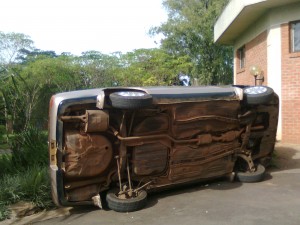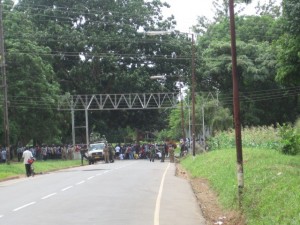
OK, so he’s not quite decapitated, but after the student riot here at Chancellor College on the night of 2/15 he lost his mortar board. (So sad, especially after all that work by the masons just last week—see photo in my earlier post). As it happens, I was inadvertently caught up in this event. Here is a brief blow-by-blow. (Spoiler alert—things seem to have calmed down now, even if the discontent is not gone and some more organized protests are planned for the next few days . . .)
On the evening of 2/15 I walked down to my campus office at 7pm (about 10 minutes away from where I’m staying) to check email and do some work as usual; in the Great Hall there was a rowdy meeting going on. I peered in and the place was teeming with about 500 or so students, some making speeches into a microphone and others blowing those vuvuzelas; others were running up and down the aisles waving branches. At first I thought it was a religious rally (there are a lot of those held in the Great Hall), but it looked and sounded to me rather like a student union meeting or something. Thinking nothing of it, I went down to my office and got to work; after about 20 minutes I heard a loud ruckus in the exterior, colonnaded corridor outside my office door. All those students in the Hall were now marching through the halls of the College chanting slogans and banging very hard—some kicking—on my door. I was the only one around, and they could tell I was in my office because they could see the light on–there’s a window at top of the door. (Though let me be quick to add that the students surely were not singling me out–I just happened to be the only professor in my office at that time.) Because there were so many students, the fracas went on for a long time, back and forth down the hall. Some banged so hard on the door I could see it buckle and shake a bit from the inside. (Fortunately I had locked myself in, as I always do at night.) As soon as they had passed by for good, I made a clandestine escape (with my laptop in tow), only to be caught up in the middle of the protesters’ road blockade on my walk home. It gets dark here at 6-ish, so by 7 it is completely dark, especially so in the halls where none of the exterior lights work. Once the riot moved to the road, the students wouldn’t let cars pass. They threw rocks at cars. They set bonfires in the road, smashed the Principal’s windscreen (he was not in the vehicle at the time) and overturned a four-door sedan right in the middle of campus (ironically, a student’s car). And they vandalized the statue of that poor mortar-boarded scholar. (See above.) Fortunately, no one accosted me as I made my way home through the throng, but I was unsure enough about my safety not to risk taking pictures at the time, which would have been easily noticeable because of the flash. Only about 50 or so ringleaders were being really aggressive and destructive. Others were just milling about and walking along. But, even so, things were definitely not in control; you could sense a mob mentality. I tried hard to give them the benefit of the doubt at first, i.e., that it was just general student rowdiness and healthy protest, but I could see it was spiraling out of control.

So, why were they rioting? Turns out, no good reason, really, at least not a reason that justifies a strike directed against the College per se. The aition for the protest that I hear from the student protesters themselves isn’t even the College’s fault: the National Bank delayed by two weeks payment of (a relatively small) government stipend to students because of some bureaucratic red tape—something that was/is completely out of the College’s hands. This stipend is earmarked for books and supplies, but every student I’ve spoken to has told me that it is the rare student who uses that grant for said purpose; most use it to buy beer, or clothes, or cell phones, or airtime. But, be that as it may, there are surely other things adding fuel to the flame: the riots/protests in Egypt, and now Yemen and Iran. (Just my speculation.) There’s also a no-confidence vote afoot from the Academic Staff Union (not students) about the Principal of the College here (a really great and competent guy, actually), so there’s already an air of discontent wafting about. I think the students are copycatting some of that and/or riding on those waves. There’s also an Academic Staff Union sit-in and protest this week in legitimate support of academic freedom for a Chancellor College professor/political analyst who writes a column in the local Nation newspaper and who was supposedly questioned by the police about the content of his courses.

The next morning the police—toting machine guns and tear gas—came down to put a damper on things. (See photo.) The protesters have since obtained an authorized permit to march up to the National Bank branch in town with police escort to protest legally/peacefully there (or so I hear). There have been no classes held here for two days, and classes appear to be canceled for Friday, though I am happy to report that all my Oresteia seminarians have been coming to our class at the house where I’m staying, so we haven’t missed a beat.
It is sad to see the damage the student protesters inflicted on a campus already in need of so much, but, as is typical in most events of this kind, it is only a few who are destructive and violent. The vast majority of students here just want to get on with their studies. In any case, such vehemence, in my experience, is totally atypical of peaceful, friendly, law-abiding Malawians, who most certainly should stand up for each and every one of their human and civic rights, but who know better than to descend to the level of petty and counter-productive vandalism. As an alternative to that, the resolution of the Oresteia seems timely. One could point to Athena’s use of reason and persuasion at the end of the trilogy to appease and reconcile the violent, atavistic Erinyes, who, once transformed into Eumenides, become a vital asset to the democratic community. And although, as Pasolini notes in his film (with Aeschylean wisdom), the complex social and economic problems of the modern world are daunting–so daunting, in fact, that they are perhaps not so much to be solved as to be lived–such a transformation from harmfulness to helpfulness is the outcome we all should seek–in Africa, and elsewhere.
